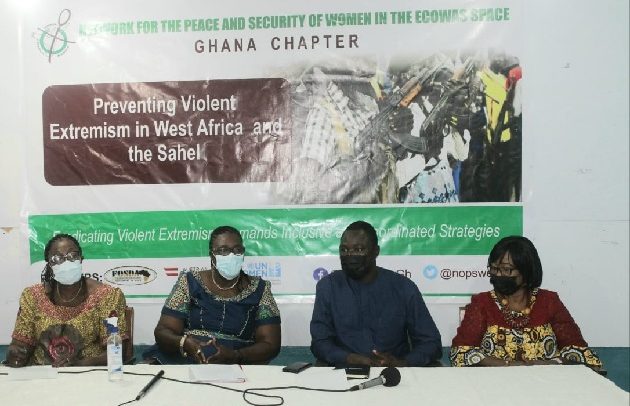NOPSWECO President, Euphemia Akos Dzathor (second from left) with executives of the network during the press launch.
The Network On Peace And Security For Women In The ECOWAS Space – Ghana (NOPSWECO – GH) has launched an initiative to actively advocate and create community awareness on Prevention Violent Extremism (PVE) in Ghana and the Sahel.
Supported by the United Nations Women (UNWOMEN) and the Austrian Cooperation, the initiative is intended to educate and empower the local population especially the youth to play effective roles in building peace and resilience against violent extremism.
It will engage in community sensitization forums, radio and television discussions and make use of videos and digital tools to enhance awareness and understanding of the threat and its drivers and how we can all collectively work to prevent violent extremism.
NOPSWECO President, Euphemia Akos Dzathor, addressing the press at the official launch of the initiative in Accra highlighted the need for such an exercise saying Ghana’s proximity to Burkina Faso, Nigeria, Mali and Niger which is experiencing attacks has led many to predict that the country could be among the next target for attacks in the region.
Madam Dzathor said the existence of pervasive ethnic and chieftaincy conflicts in Northern Ghana, together with the over 532 prolonged unresolved chieftaincy conflicts nationwide, political vigilante violence and intra-religious clashed make the teaming unemployed youth vulnerable to violent extremism.
“There are very porous borders especially with Northern border with Burkina Faso with regular and unmonitored crossing between the two countries… Preventing and Countering Violent Extremism (PCVE) programming and State counter terrorism measures have been disproportionately led by the State and focused more on males,” she said.
Madam Dzathor said the success in PVE will be difficult to achieve without the full participation of civil society groups and local community members including women, adding that the local population is best placed to identify signs and threats in their communities, before even State actors.
“Women leaders who are adequately informed on PVE and peace building have a higher chance of contributing effectively to breaking social habits and tendencies that inspire extremism and undermine peace. Their understanding of the threat will enable them to be willing to support the work of the police by reporting suspicious activities as well as dissuading peers from engaging in activities that can lead then into extremism,” she said.
By Jamila Akweley Okertchiri

